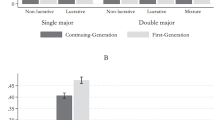Abstract
In this study a large national data set was used to assess the causal influence of college selectivity on earnings after controlling for a variety of background variables such as family background, financial considerations, academic ability, and degree aspirations. Using a recursive structural equation model, it was found that for both genders selectivity had a significant direct and indirect effect on earnings; however, selectivity could explain only a minute percentage of variance in income above and beyond the controls. Males and females differed slightly on the total effect of selectivity on earnings, but the indirect effect was twice as large for women as for men.
Similar content being viewed by others
References
Astin, A. W., and Henson, J. W. (1977). New measures of college selectivity.Research in Higher Education 6: 1–9.
Braxton, J. M., and Nordvall, R. C. (1985). Selective liberal arts colleges: Higher quality as well as higher prestige?Journal of Higher Education 56: 538–554.
Duncan, O. D. (1961). Properties and characteristics of the socioeconomic index: In A. J. Reiss (ed.),Occupations and Social Status pp. 139–161. New York: Free Press.
McClelland, K. (1977). Appendix C: The “Productive Americans” survey: In C. Jencks and L. Rainwater (eds.),The Effects of Family Background, Test Scores, Personality Traits, and Schooling on Economic Success. Springfield, VA: Final report under National Institute of Education Grant NIE-G-74-0077, National Technical Information Service.
Pedhazur, E. (1982).Multiple Regression in Behavioral Research 2nd ed. New York: Holt, Rinehart and Winston.
Sewell, W., and Hauser, R. (1975).Education, Occupation, and Earnings: Achievement in the Early Career. New York: Academic Press.
Smart, J. C. (1986). College effects on occupational status attainment.Research in Higher Education 24: 73–95.
Solmon, L. (1973). The definition and impact of college quality: In L. Solmon and P. Taubman (eds.),Does College Matter? pp. 77–105. New York: Academic Press.
Solmon, L. (1975). The definition of college quality and its impact on earnings.Explorations in Economic Research 2: 537–587.
Taubman, P., and Wales, T. (1973). Higher education, mental ability, and screening.Journal of Political Economy 81(1): 28–55.
Trusheim, D., and Crouse, J. (1981). Effects of college prestige on men's occupational status and income.Research in Higher Education 14: 283–303.
Wachtel, P. (1975). The effect of school quality on achievement, attainment levels, and lifetime earnings.Explorations in Economic Research 2: 502–536.
Wolfle, L. M. (1985). Applications of causal models in higher education: In J. Smart (ed.),Higher Education: Handbook of Theory and Research, Vol. 1, pp. 381–413. New York: Agathon Press.
Wolfle, L. M., and Ethington, C. (1985). GEMINI: Program for analysis of structural equations with standard errors of indirect effects.Behavior Research Methods, Instruments, and Computers 17: 581–584.
Author information
Authors and Affiliations
Rights and permissions
About this article
Cite this article
Mueller, R.O. The impact of college selectivity on income for men and women. Res High Educ 29, 175–191 (1988). https://doi.org/10.1007/BF00992285
Received:
Issue Date:
DOI: https://doi.org/10.1007/BF00992285



